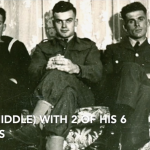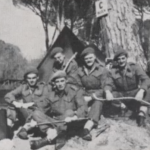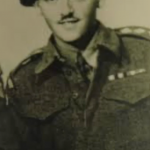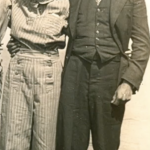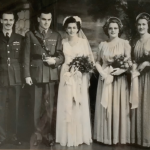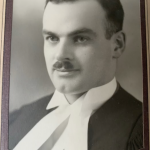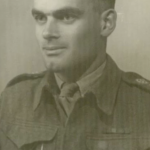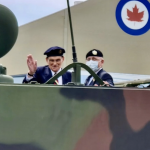Harry Eisenhauer was born on July 9, 1920, at Lower La Have, Lunenburg County, Nova Scotia, one of the nine children of John and Lillian Eisenhauer. His family ties to Lunenburg County go back to 1753, when the German immigrants to Halifax in 1751 were moved to the site of Lunenburg to establish a new town. Harry attended a one room school, where nine grades were taught in one room by one teacher. He was able to continue at school, as he showed some scholastic promise. Harry attended Riverport High School where his teacher was a lieutenant in the West Nova Scotia Regiment militia unit; he suggested that the boys join the militia, especially as war was on the horizon. With Hitler threatening war, Harry joined the Canadian Officers’ Training Corp at Dalhousie, where he was studying science. In September he wrote to the commanding officer of the West Nova Scotia Regiment and was told to report for duty at Bridgewater. Because of his COTC training and the lack of personnel, it was noted that Harry was officer “material”, but there was a policy at that time that officers would not be sent overseas until they were 20 years old (Harry was then 19). He thus returned to college for another year at Dalhousie, with the expectation of a later re-enlistment. Harry continued his studies in the COTC and was made a sergeant. He also took the opportunity to study German. In the summer of 1940, a letter was sent to the members of the COTC class, asking if they would consider enlisting as potential reinforcement officers for the units overseas (where the West Nova Scotia Regiment then was). Harry replied that he would go, and a couple of weeks later was asked to report for duty in Halifax. He became a first lieutenant in the Princess Louise Fusiliers. They boarded the troopship Leopoldville and headed to Britain, arriving at Liverpool without incident. The next two years were spent in England, where they moved around a bit and kept up their training routine. In early 1943 things became active: the regiment went to Scotland for landing craft exercises and then they were off to Italy on the Polish liner Batory. They landed in Sicily, where they were held mostly in reserve, and then they crossed the Messina strait into Italy, where they began their slow move up the peninsula. Harry was twice wounded in the battle of the “Gully” near Ortona on December 13, 1943 and while in the hospital he developed hepatitis, and went into convalescence. He was back in the line by May, and involved in the attack on the Gustav Line. When things calmed down, he was sent to 3rd Cdn Infantry Brigade headquarters as Brigade Intelligence officer, a position which he held until early in January, 1945. Harry missed the heavy fighting in which the battalion was engaged except for the Hitler line battle, and he lost his friend Harvey Jones, who was killed near Russi in the late autumn of 1944. In March 1945 the division was moved to France, then billeted in Brussels until they went into action in Holland. Harry’s company had little contact with the enemy until the war ended, and they were able to rejoice at Appeldorn with the newly liberated Dutch people. When the war ended, all the majors in the battalion except Harry volunteered for the army of occupation or for service in the Pacific. He thus found himself appointed as Commanding Officer of the West Nova Scotia Regiment and subsequently the Commander of a ‘repatriation’ unit. They embarked at an English port on the Ile de France and arrived in Halifax in early October. They were frustrated to learn on the morning of their arrival that they would not be able to disembark until supper time, as the Premier would only be available to greet them at about 7pm. Premier MacDonald welcomed the regiment home and presented the regiment with a flag of Nova Scotia. When Harry began his thank-you address, his father, who was sitting a few yards behind him, said to his brother: “my God, he sounds like a Limey”. That long period in England had done a lot to erase Harry’s Lunenburg German accent. Two weeks after arriving home he was married to Lorna Wentzell, one of the pretty Grade 11 girls from Bridgewater High School. They had been unofficially engaged before Harry went overseas. During the war, Harry was involved in several court martials, including a murder trial. He became interested in law and pursued it at Dalhousie. He became a trust officer at Halifax upon graduation and was transferred to the Saint John, NB office two years later, all while starting a family. Harry later moved out to Alberta, taking a job at Dome Petroleum. Now 101, Harry looks back upon his life and reflects that he may be the epitome of the adage, “old soldiers never die, they simply fade away”. We were very lucky to meet Harry Eisenhauer and his daughter Janice over zoom in August 2021, after reading about the round of golf he played on the occasion of his 100th birthday.
Videos
Click next video below to keep watching

